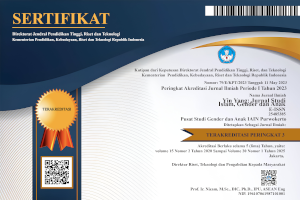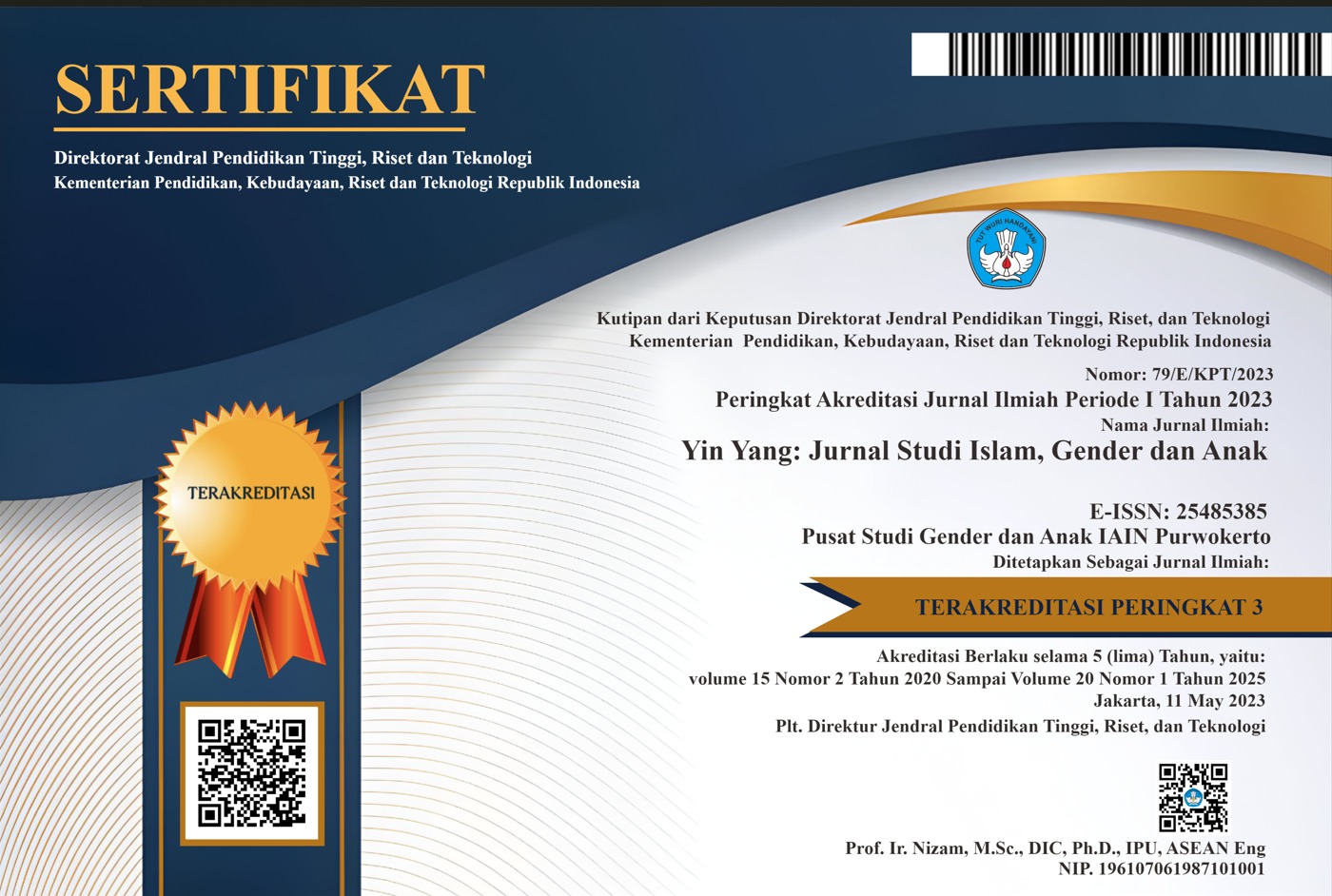The Impact of Changing Gender Roles on the Dynamics of Family Law in the Modern Era
DOI:
https://doi.org/10.24090/yinyang.v19i1.9513Kata Kunci:
Dynamics of Family Law, Modern Era, Changing Gender RoleAbstrak
The role of gender in society has undergone significant changes in recent decades. Social transformation, economic advancements, and the increasing advocacy for gender equality have influenced the dynamics of family law. This research aims to analyze the impact of changing gender roles on family law dynamics in the context of the modern era. In this case study, the researcher will examine how changes in gender roles affect child custody, roles in marriage and divorce, and other legal implications using a qualitative approach by collecting data from various sources, such as literature reviews, documentation, and analysis of related legal cases. Data analysis will be conducted using a comparative descriptive approach to identify changes occurring in family law and its relation to changing gender roles. The results of this study indicate that changes in gender roles within family law have significant impacts in the modern era. These changes include the expected roles of husbands and wives in marriage, child custody after divorce, as well as legal protection against gender discrimination and access to fair legal services. Although challenges still exist, it is important for society and the legal system to support these changes and address existing barriers. Thus, marital and divorce relationships can become more balanced, fair, and consider the best interests of the couples and children involved.Unduhan
Referensi
Amato, P. R. (2010). Research on divorce: Continuing trends and new developments. Journal of Marriage and Family, 72(3), 650-666.
Amato, P. R. (2010). Research on divorce: Continuing trends and new developments. Journal of Marriage and Family, 72(3), 650-666.
Abidin, Z. (2017). Kesetaraan gender dan emansipasi perempuan dalam pendidikan Islam. Tarbawiyah: Jurnal Ilmiah Pendidikan, 12(01), 1-17.
Archer, L., et al. (2018). Towards gender equality? Exploring the impact of policy and legislation on women’s equality in five domains in six countries. Social Inclusion, 6(3), 202-213.
Brinig, M. F., & Buckley, F. H. (2001). No-fault laws and at-fault people. Journal of Legal Studies, 30(2), 507-536.
Cabrera, N. J., Tamis-LeMonda, C. S., Bradley, R. H., Hofferth, S., & Lamb, M. E. (2000). Fatherhood in the twenty-first century. Child Development, 71(1), 127-136.
Cashmore, J., & Parkinson, P. (2011). Parenting and post-separation contact: The views and experiences of separated parents. Australian Journal of Family Law, 25(1), 24-47.
Collier, R. (2018). Rethinking family law in the era of changing gender roles. Yale Journal of Law & Feminism, 30(1), 1-42.
Daud, F. K., & Rosadi, A. (2021). Dinamika Hukum Keluarga Islam dan Isu Gender di Iran: Antara Pemikiran Elit Sekuler dan Ulama Islam. Volksgeist: Jurnal Ilmu Hukum Dan Konstitusi, 205-2020. DOI: https://doi.org/10.24090/volksgeist.v4i2.5258
Dahlan, M. (2019). Paradigma Maqashid Al- Syari'ah Dalam Menjawab Dinamika. Jurnal Islam Nusantara, 03 (02), 357–387.
Ely, R. J., et al. (2011). Explaining the persistence of gender inequality: The work-family narrative as a social defense against the 24/7 work culture. Administrative Science Quarterly, 56(1), 1-42.
Farid, D., Pakarti, M. H. A., Nu'man, M. H., Hendriana, H., & Fathiah, I. (2023). Talak Perspektif Kesetaraan Gender: Perintah Tuhan Menerapkan Egaliter Di Dalam Rumah Tangga. Tahkim (Jurnal Peradaban dan Hukum Islam), 6(1), 1-18.
Finch, J., & Mason, J. (2017). Gendering family law in England and Wales: Equality and difference in the jurisdiction of the courts. Feminist Legal Studies, 25(3), 219-241.
Inglehart, R. (2018). Gender role transformations and trends in family behaviors. Journal of Family Issues, 39(10), 2757-2782.
Jensen, R., & Oster, E. (2017). The power of TV: Cable television and women's status in India. The Quarterly Journal of Economics, 132(3), 1057-1094.
Khairuddin, K. (2022). Alasan Perceraian Luar Pengadilan Dan Akibatnya Bagi Masyarakat Desa Sanggaberu Kecamatan Gunung Meriah Aceh Singkil. Tahkim (Jurnal Peradaban Dan Hukum Islam), 5(1), 43–58. https://doi.org/10.29313/tahkim.v5i1.9356.
Kurniawan, R. (2019). Urgensi Bekerja Dalam Alquran. Jurnal Transformatif, 3 (1), 42–67. https://doi.org/10.23971/tf.v3i1.1240.
Lamb, M. E. (2010). How do fathers influence children's development? Let me count the ways. In M. E. Lamb (Ed.), The role of the father in child development (5th ed., pp. 1-26). Wiley.
Lamb, M. E. (2012). Mothers, fathers, families, and circumstances: Factors affecting children's adjustment. Applied Developmental Science, 16(2), 98-111.
Latief, M. N. H., & Wates, P. A. (2016). Pembaharuan Hukum Keluarga Serta Dampaknya Terhadap Pembatasan Usia Minimal Kawin Dan Peningkatan Status Wanita. Jurnal Hukum Novelty, 7(2), 196.
Maccoby, E. E., & Mnookin, R. H. (1992). Dividing the child: Social and legal dilemmas of custody. Harvard University Press.
Rimmerman, A., & Ashkenazi, A. (2019). Gender roles and marriage satisfaction in long-term marriages. Journal of Family Issues, 40(11), 1460-1485.
Setiawan, E. (2014). Dinamika Pembaharuan Hukum Keluarga Islam di Indonesia. De Jure: Jurnal Hukum dan Syar'iah, 6(2). DOI: https://doi.org/10.18860/j-fsh.v6i2.3207
Suryani, S. (2022). Analisis Hukum Keluarga Islam Terhadap Penguatan Peran Perempuan Dalam Kesetaraan Gender Pada Pengurus Muslimat Dan Pengurus Aisyiyah Di Kota Metro. Familia: Jurnal Hukum Keluarga, 3(2), 151-171.
Sarkadi, A., Kristiansson, R., Oberklaid, F., & Bremberg, S. (2008). Fathers' involvement and children's developmental outcomes: A systematic review of longitudinal studies. Acta Paediatrica, 97(2), 153-158.
Sullivan, O., & Coltrane, S. (2008). Men's changing family roles in the United States: Evidence from a longitudinal study of men's and women's personal narratives. Journal of Family Issues, 29(8), 1067-1090.
Thiara, R. K., & Gill, A. K. (2010). Violence against women in South Asian communities: Issues for policy and practice. Jessica Kingsley Publishers.
Yogyakarta Principles. (2017). Yogyakarta Principles plus 10: Additional principles and state obligations on the application of international human rights law in relation to sexual orientation, gender identity, gender expression and sex characteristics to complement the Yogyakarta Principles. Retrieved from https://yogyakartaprinciples.org/.
Unduhan
Diterbitkan
Cara Mengutip
Terbitan
Bagian
Lisensi
Hak Cipta (c) 2024 Muhammad Husni Abdulah Pakarti, Edy Saputra, Husain, Lexy Fatharany Kurniawan, Nahdia Nazmi

Artikel ini berlisensiCreative Commons Attribution-ShareAlike 4.0 International License.
Authors who publish with this journal agree to the following terms: Authors retain copyright and grant the journal right of first publication with the work simultaneously licensed under a Creative Commons Attribution-ShareAlike 4.0 International License that allows others to share the work with an acknowledgment of the work's authorship and initial publication in this journal.

















